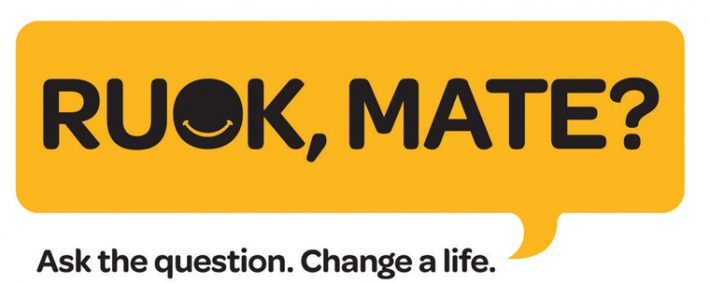
This R U OK Day, be a good mate and ask R U Ok? Did you know that tradies are twice as likely to commit suicide than other people in Australia? As a matter of fact, the statistics surrounding suicide and mental health within the construction industry are quite confronting.
In this male dominated industry people are often asked to ‘toughen up’ with negligence of possible consequences and people’s feelings, what is happening in their lives and why they might be feeling depressed or not themselves.
Still it’s been a rough couple of months for everyone during this pandemic with huge changes to both our work and personal environment. For this reason we should all be looking out for each other and let our mates know that it’s okay not to be okay.
At Kanga we want to encourage you to be a good mate and ask ‘R U OK’. As part of R U OK day we want to promote awareness for people that may be at risk of mental health issues or potentially suicide in our community.
So, here are some useful tips on how to ask R U OK, as well as how to act when we’ve been told “No, I am not ok.” Follow theses 4 Steps as recommended by the RUOK foundation (Source: www.ruok.org.au):
1. ASK R U OK?
- Be relaxed, friendly and concerned in your approach.
- Help them open up by asking questions like “How are you going?” or “What’s been happening?”
- Mention specific things that have made you concerned for them, like “You seem less chatty than usual. How are you going?”
IF
- If they don’t want to talk, don’t criticise them.
- Tell them you’re still concerned about changes in their behaviour and you care about them.
- Avoid a confrontation.
- You could say: “Please call me if you ever want to chat” or “Is there someone else you’d rather talk to?” So, make sure to look after your employees, your workmates as well as your boss. If you notice something’s not right, don’t be afraid to approach them and ask whether they are doing ok.
2. LISTEN WITH AN OPEN MIND
- Take what they say seriously and don’t interrupt or rush the conversation.
- Don’t judge their experiences or reactions but acknowledge that things seem tough for them.
- If they need time to think, sit patiently with the silence.
- Encourage them to explain: “How are you feeling about that?” or “How long have you felt that way?”
- Show that you’ve listened by repeating back what you’ve heard (in your own words) and ask if you have understood them properly.
3. ENCOURAGE ACTION
- Ask: “What have you done in the past to manage similar situations?”
- Ask: “How would you like me to support you?”
- Ask: “What’s something you can do for yourself right now? Something that’s enjoyable or relaxing?”
- You could say: “When I was going through a difficult time, I tried this… You might find it useful too.”
- If they’ve been feeling really down for more than 2 weeks, encourage them to see a health professional. You could say, “It might be useful to link in with someone who can support you. I’m happy to assist you to find the right person to talk to.”
- Be positive about the role of professionals in getting through tough times.
4. CHECK IN
- Pop a reminder in your diary to call them in a couple of weeks. If they’re really struggling, follow up with them sooner.
- You could say: “I’ve been thinking of you and wanted to know how you’ve been going since we last chatted.”
- Ask if they’ve found a better way to manage the situation. If they haven’t done anything, don’t judge them. They might just need someone to listen to them for the moment.
- Stay in touch and be there for them. Genuine care and concern can make a real difference.
If you’re worried about your mate and have a feeling they need professional support, encourage them to connect with a trusted health professional like their doctor or other support like Lifeline at 13 11 14. Further support tools can be found here: www.ruok.org.au/findhelp
For more information mental health issues within the construction industry you can read the following articles:
https://chessconnect.org.au/mental-health-construction-industry


Leave a Reply